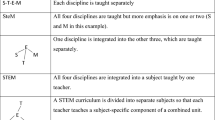Abstract
The goals of this study are to understandelementary school teachers' beliefs andpractices and to unveil factors that influencethe way teachers adapt mathematics reformrhetoric when trying to adopt it. In theresearch, I searched for beliefs beyondmathematics that influence teachers' decisionsand choices for teaching mathematics. Workingwith children from different socioeconomicbackgrounds, teachers interpret reform indifferent ways. Based on their concept of students' needs, teachers select which partsof the reform documents are appropriate fortheir students. While children from uppersocioeconomic backgrounds experience problemsolving, those from lower socioeconomicbackgrounds undergo rote learning. Because notall children have the opportunity to learn thesame quality mathematics, the emerging concernof this study is the issue of equity inmathematics teaching.
Similar content being viewed by others
REFERENCES
Anyon, J. (1981). Social class and knowledge. Curriculum Inquiry, 11, 3–42.
Apple, M. W. (1992). Do the Standards go far enough? Power, policy, and practice in mathematics education. Journal for Research in Mathematics Education, 23, 432–437.
Boaler, J. (2002). Learning from teaching: Exploring the relationship between reform curriculum and equity. Journal for Research in Mathematics Education, 33, 239–258.
Clark, C. M. & Peterson, P. L. (1986). Teachers' thought processes. In M. C. Wittrock (Ed.), Handbook of research on teaching (3rd ed.) (pp. 255–296). New York: Macmillan.
Cuban, L. (1993). How teachers taught: Constancy and change in American classrooms, 1880- 1990 (2nd ed.). New York: Teachers College Press.
Eisner, E.W. (1992). Curriculum ideologies. In P. W. Jackson (Ed.), Handbook of research on curriculum (pp. 302–326). New York: Macmillan Publishing Company.
Erickson, F. (1986). Qualitative methods in research on teaching. In M. C. Wittrock (Ed.), Handbook of research on teaching (3rd ed.) (pp. 119–161). New York: Macmillan Publishing Company.
Ernest, P. (1991). The philosophy of mathematics education. Bristol, PA: Falmer Press.
Fennema, E. & Nelson, B. S. (Eds.) (1997). Mathematics teachers in transition. Mahwah, NJ: Lawrence Erlbaum Associates.
Ferrini-Mundy, J. & Schram, T. (Eds.) (1997). The recognizing and recording reform in mathematics education project: Insights, issues and implications. Journal for research in mathematics education monograph series No. 8. Reston, VA: National Council of Teachers of Mathematics.
Haberman, M. (1991). The pedagogy of poverty versus good teaching. Phi Delta Kappan, 73, 290–294.
Irvine, J. J. (1990). Black students and school failure. New York: Praeger.
Glaser, B. & Strauss, A. (1967). The discovery of grounded theory. Chicago: Aldine.
Lappan, G. (1999). Revitalizing and refocusing our efforts. Journal for Research in Mathematics Education, 30, 568–578.
Moreira, A. F. B. & Silva, T. T. (1995) Sociologia e teoria crítica do currículo: Uma introdução. [trans. Sociology and curriculum critical theory: An introduction] In A. F. Moreira & T. T. da Silva (Eds.), Currículo, cultura e sociedade (2nd ed.) (pp. 7–37). São Paulo, Brazil: Cortez Editora.
National Council of Teachers of Mathematics (1989). Curriculum and evaluation standards for school mathematics. Reston, VA: Author.
Nelson, B. S. (1997). Learning about teacher change in the context of mathematics education reform: Where have we come from? In E. Fennema & B. S. Nelson (Eds.), Mathematics teachers in transition (pp. 3–15). Mahwah, NJ: Lawrence Erlbaum Associates.
Oakes, J. (1990). Multiplying inequalities: The effects of race, social class, and tracking opportunities to learn mathematics and science. Santa Monica, CA: Rand Corporation.
Raymond, A. (1997). Inconsistency between a beginning elementary school teacher's mathematics beliefs and teaching practices. Journal for Research in Mathematics Education, 28, 550–576.
Schifter, D. & Fosnot, C. T. (1993). Reconstructing mathematics education: Stories of teachers meeting the challenge of reform. New York: Teachers College Press.
Secada, W. G. (1992). Race, ethnicity, social class, language, and achievement in mathematics. In D. A. Grouws (Ed.), Handbook of research on mathematics teaching and learning (pp. 623–660). New York: Macmillan.
Skott, J. (2001). The emerging practices of a novice teacher: The roles of his school mathematics images. Journal of Mathematics Teacher Education, 4, 3–28.
Stake, R. E. (1994). Case studies. In N. K. Denzin & Y. S. Lincoln (Eds.), Handbook of qualitative research (pp. 236–247). Thousand Oaks, CA: Sage.
Stigler, J. & Hiebert, J. (1999). The teaching gap: Best ideas from the world's teachers for improving education in the classroom. New York: The Free Press.
Strauss, A. & Corbin, J. (1990). Basics of qualitative research. Newbury Park, CA: Sage.
Thompson, A. (1984). The relationship of teachers' conceptions of mathematics and mathematics teaching to instructional practice. Educational Studies in Mathematics, 15, 105–127.
U.S. Department of Education (1999). Teacher quality: A report on the preparation and qualification of public school teachers. Washington: Office of Educational Research and Improvement, National Center for Education Statistics (NCES 1999-080).
Wood, T., Cobb, P. & Yackel, E. (1991). Change in teaching mathematics: A case study. American Educational Research Journal, 28, 587–616.
Author information
Authors and Affiliations
Rights and permissions
About this article
Cite this article
Sztajn, P. Adapting Reform Ideas in Different Mathematics Classrooms: Beliefs Beyond Mathematics. Journal of Mathematics Teacher Education 6, 53–75 (2003). https://doi.org/10.1023/A:1022171531285
Issue Date:
DOI: https://doi.org/10.1023/A:1022171531285




